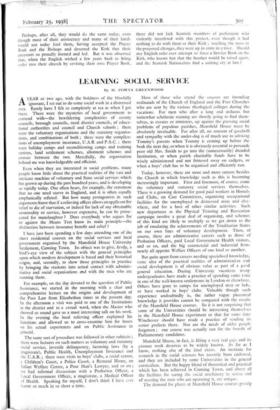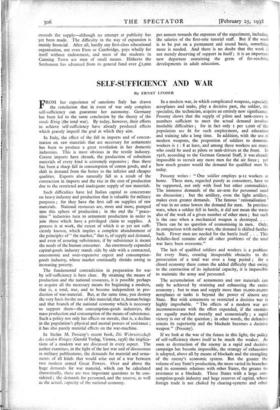LEARNING SOCIAL SERVICE
By H. POWYS GREENWOOD
AYEAR or two ago, with the boldness of the blissfully ignorant, I set out to do some social work in a distressed area. Rarely have I felt so completely at sea as when I got there. There were the mysteries of local government to contend with—the bewildering complexities of county councils, borough councils, rural district councils, of educa- tional authorities and council and Church schools ; there were the voluntary organisations and the statutory organisa- tions, and combinations of both ; there were the complica- tions of unemployment insurance, U.A.B. and P.A.C. ; there were holiday camps and reconditioning camps and training centres, land settlement schemes, allotment schemes and crosses between the two. Mercifully, the organisation behind me was knowledgeable and efficient.
Even when they are interested in social problems, many people know little about the practical realities of the vast and intricate machine of voluntary and State social services which has grown up during the past hundred years, and is developing so rapidly today. One often hears, for example, the statement that no one need starve in England, and it is often equally emphatically refuted. But how many protagonists in such arguments know that if a relieving officer allows an applicant for relief to die of starvation, or indeed for lack of any obtainable commodity or service, however expensive, he can be prose- cuted for manslaughter ? Does everybody who argues for or against the Means Test know its main principle—the distinction between insurance benefit and relief ?
I have just been spending a few days attending one of the short residential courses on the social services and local government organised by the Mansfield House University Settlement, Canning Town. Its object was to give, firstly, a bird's-eye view of the subject with the general principles upon which modern development is based and their historical origin, and, secondly, to show those principles in practice by bringing the students into actual contact with adminis- trative and social organisations and with the men who arc running them.
For example, on the day devoted to the question of Public Assistance, we started in the morning with a clear and comprehensive lecture on the origins and development of the Poor Law from Elizabethan times to the present day. In the afternoon a visit was paid to one of the Institutions in the district and to a casual ward, when the Master who showed us round gave us a most interesting talk on his work. In the evening the local relieving officer explained his functions and allowed us to cross-examine him for hours on his actual experiences and on Public Assistance in general.
The same sort of procedure was followed in other subjects ; there were lectures on such matters as voluntary and statutory social service, juvenile delinquency, licensing laws (by a magistrate), Public Health, Unemployment Insurance and the U.A.B. ; there were visits to boys' clubs, a social centre, a Children's Court, a Police Court, a Remand Home, an Infant Welfare Centre, a Poor Man's Lawyer, and so on ; we had informal discussions with a Probation Officer, a Local Government Officer; a magiStrate, a Medical Officer of Health. Speaking for myself, I don't think I have ever learnt so much in so short a time. Most of those who attend the courses are intending ordinands of the Church of England and the Free Churches who are sent by the various theological colleges during the vacations. For men who after a long and arduous but somewhat scholastic training are shortly going to find them- selves, as curates or ministers, up against the pressing social problems of populous parishes, Mansfield House must be absolutely invaluable. For after all, no amount of goodwill and sympathy with the under-dog is of much use in advising Tommy's parents when Tommy is coming up before the beak the next day, or when it is obviously essential to persuade poor old Mrs. Smith to go into the (unnecessarily) dreaded Institution, or when parish charitable funds have to be wisely administered and not frittered away on cadgers, or when a boys' club has to be organised and efficiently run.
Today, however, there are more and more careers besides the Church in which knowledge such as this is becoming increasingly important. First and foremost, of course, come the voluntary and statutory social services themselves. There is a growing demand for good paid workers in Hostels and Clubs, on Care Committees, organising occupational facilities for the unemployed in distressed areas and else- where, and for a host of other similar activities. Such new departures as the Physical Training and Recreation campaign involve a great deal of organising, and schemes of this kind are likely to multiply as we get down to the job of emulating the achievements of the Totalitarian States on our own lines of voluntary development. Then, of course, there are administrative careers such as those of Probation Officers, paid Local Government Health visitors, and so on, and the big commercial and industrial firms nearly all appoint Welfare Officers of one kind or another.
But quite apart from careers needing specialised knowledge, some idea of the practical realities of administration and social development is of obvious value as part of a goad general education. During University vacations many undergraduates have made a practice of spending some time in one of the well-known settlements ii London or elsewhere. Others have gone to camps for unemployed men or lads, or have worked in boys' clubs. Valuable though such experience undoubtedly is, the rather vague piecemeal knowledge it provides cannot be compared with the results of the Mansfield House courses. So it is not surprising that some of the Universities should be interesting themselves in the Mansfield House experiment or that for some time Winchester should have made a practice of sending its senior prefects there. Nor are the needs of older people forgotten ; one course was actually run for the benefit of Parliamentary candidates.
Mansfield House, in fact, is filling a very real gap, and its pioneer work deserves to be widely known. As far as I know, nothing else of the kind exists. An institute for research in the social sciences has recently been endowed, and they are included by some Universities in the general curriculum. But the happy blend of theoretical and practical which has been achieved in Canning Town, and above all the facilities for seeing the social machinery in action and of meeting the men who are operating it, arc unique.
The demand for places at Mansfield House courses greatly exceeds the supply—although no attempt at publicity• has yet been made. The difficulty in the way of expansion is mainly financial. After all, hardly any first-class educational organisation, not even Eton or Cambridge, pays wholly for itself without endowment, and most of the students in Canning Town are men of small means. Hitherto the Settlement has advanced from its general fund over LI,000 per annum towards the expenses of the experiment, including the salaries of the first-rate tutorial staff. But if the work is to be put on a permanent and sound basis, something more is needed. And there is no doubt that the work is not merely deserving of support in itself ; it is an important new departure containing the germ of far-reaching developments in adult education.

















































 Previous page
Previous page